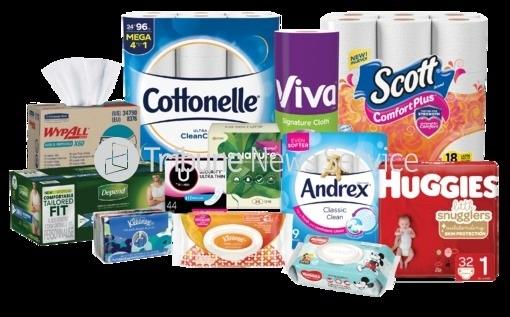Prices of toilet paper, diapers, facial tissues and paper towels will likely rise in coming weeks as Irving-based consumer giant Kimberly-Clark warned Monday that inflation and supply chain concerns aren’t “likely to be resolved quickly.”
The maker of household items such as Huggies diapers, Kleenex facial tissues and Scott paper towels also cut its annual forecast for the third consecutive quarter. Adjusted earnings will be $6.05 to $6.25 a share this year, the company said, down from a prior projection of as much as $6.90.
CEO Michael Hsu said the company is facing a “volatile and difficult macro environment.”
“Our earnings were negatively impacted by significant inflation and supply chain disruptions that increased our costs beyond what we anticipated,” he said in a statement as the company reported earnings for the July through September period. “We are taking further action, including additional pricing and enhanced cost management, to mitigate these headwinds as it is becoming clear they are not likely to be resolved quickly.”
Hsu’s price hike warning comes despite double-digit growth in quarterly sales for several of Kimberly-Clark’s personal care products and improving performance in its tissue and professional supplies business.
Quarterly sales totaled $5 billion, up 7% from the same period a year ago. In North America, Kimberly-Clark reported a 3% sales increase in consumer goods and 16% increase in professional products. Outside North America, sales were up 6% in developing and emerging countries and were even with year-ago in developed markets.

But its operating profit slid by just over 1% to $657 million, including charges related to a 2018 restructuring.
Kimberly-Clark said its costs rose by $480 million on higher pulp, polymer, distribution and energy expenses.
“The global supply chain is under pressure and we do expect cost to remain elevated for a period,” Hsu told analysts during a conference call. “Not all costs. ... But the polymer-based products seem like they’re going to remain elevated for a little while. We mentioned U.S. labor costs and pressures on transportation globally. I think that’s going to remain elevated for a while because I don’t see a fundamental catalyst to change that in the near term. And so that’s why we’re making some of our moves.”
Diana Gomes, a Bloomberg Intelligence analyst who tracks the company, said she doesn’t expect Kimberly-Clark’s earnings to realize price hike benefits until 2022, forcing the company to sacrifice profit in order to advertise its products.
“Ads are needed as it passes additional premium-product price hikes to customers to counter input costs $1.4 [billion] to $1.5 billion above 2020′s amid pulp, transportation and energy-input inflation,” Gomes wrote Monday.
Kimberly-Clark’s emerging market expansion, beyond premium diaper sales in China, might not be enough to prevent an expected 1% to 2% sales decline this year, after a 6% boost in 2020, Gomes said.
Sales spikes in tissues and toilet paper during COVID-19 are “decelerating faster than expected, so a rebound in the professional hygiene segment is critical” as vaccinated workers return to offices and other public spaces, she said.
Kimberly-Clark’s 14% market share makes it the No. 2 maker of personal-hygiene products globally behind rival Procter & Gamble, according to Passport data from Euromonitor International.
Local Companies








